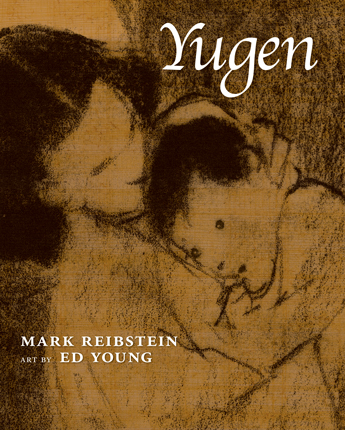| Yugen Author: Reibstein, Mark | ||
| Price: $6.50 | ||
Summary:
Illustrations, simple text, and haiku reveal a young boy's longing and remembrance of his mother.
| Illustrator: | Young, Ed |
Reviews:
Kirkus Reviews (08/15/18)
School Library Journal (10/01/18)
Booklist (+) (10/01/18)
Full Text Reviews:
School Library Journal - 10/01/2018 Gr 4–6—Having collaborated on the award-winning Wabi Sabi, Reibstein and Young return here to examine a mother and son bond. "Yugen" is both a term of endearment for protagonist Eugene and a word encompassing "the subtle and profound…the sad beauty of human suffering," according to an author's note. Written from the child's perspective, the haiku describe how Yugen's mother held him when it was cold, placed blankets under the cherry tree so they could watch the petals "fall like snow," and invented imaginary jaunts to Japan as they climbed into a "deep hot bath." Each spread presents one haiku in the Japanese style—a single vertical line without periods. Characterized by sensory images and an atmosphere of fleeting joy, they are bordered on the verso by warm, textured art with the look of papyrus. This also becomes the canvas for Young's charcoal scenes on the recto. At times, the strong figural outlines evoke Mary Cassatt; others are softly blurred, without features, or they emerge from negative space. When the mother is "gone again," reunion seems more tenuous; Yugen communes with his cat while undertaking familiar rituals. Sensitive older readers will respond to his wistful yearning, feeling the pleasure and pain of memory that accompanies love and separation. VERDICT A gorgeously crafted, complex work. A strong choice for robust poetry collections.—Wendy Lukehart, District of Columbia Public Library - Copyright 2018 Publishers Weekly, Library Journal and/or School Library Journal used with permission.
Booklist - 10/01/2018 *Starred Review* Subtly rhyming haiku relate the poignant story, told from a child’s viewpoint, of a mother who leaves home, returns, and leaves again. Both the poetry and illustrations reveal the love between the mother and son. When they are together, they watch blossoms drift down from the cherry trees and spend evenings admiring the moon and sharing warm baths. When she goes to Japan the first time without her son, the two agree to pick a star and think of the other, which seems to shorten the distance between them. The love connecting the two is obvious, which makes the void she leaves behind heartbreaking and the boy’s confusion and sorrow palpable. In a naive fantasy, when one of his cats disappears, the boy imagines the creature has gone in search of his mother. Young’s illustrations, which appear to have been created with charcoal on textured paper, are mostly blurred outlines without facial features or many details, and the text and pictures skillfully combine to portray the emotions of a small boy who is left to wonder if his absent mother will ever return. The author’s note defines the Japanese word yugen as “subtle and profound,” which will be how readers describe their feelings about this second collaboration from Reibstein and Young, after Wabi Sabi? (2008). - Copyright 2018 Booklist.



